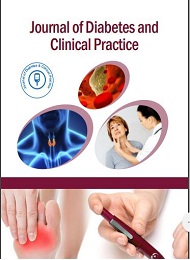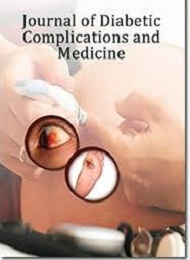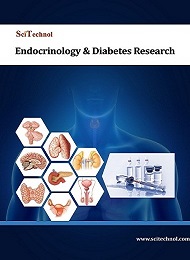Theme: Current Trends & Advancements in Diabetes Research for Better Healthcare System
Diabetes Congress 2019
Welcome!!
On behalf of the organizing and Advisory Committee of Diabetes Congress 2019, we take great pleasure in welcoming Professors, CEO’S, Directors, Surgeons, and Physicians, Research scholars, Nurses, Ph. D Students, Medical practitioners and experts of Diabetes and Endocrinology to Tokyo, Japan for the 3rd Annual Congress on Diabetes and Its Complications ( Diabetes Congress 2019) Conference which is going to be held on December 04-05, 2019 to foster the progress in the field by contributing with your expertise to what promises to be a very comprehensive and exciting meeting, and to enjoy the immense unique artistic heritage and wonderful landscape of Tokyo, Japan.
Why to attend?
Diabetes Congress 2019 highlights the theme “Current Trends & Advancements in Diabetes Research for Better Healthcare System” which places great emphasis on the latest advancements in prevention and treatment of various metabolic diseases which may be due to diabetic and endocrine complications and provides robust discussions on methods and strategies related to diagnosis, prevention and management of metabolic disorders as well as explore new ideas and concepts for treatment of Endocrine Complications..
Target Audience:
- Endocrinologists
- Diabetologists
- Researchers
- Practitioners/Doctors
- Students
- Nurse educator
- Podiatrist
- Dietitian
- Eye Doctors
- Nephrologists
Track 1:
Diabetes and Types of Diabetes
Diabetes disease is a chronic disease which occurs when the pancreas are unable to make insulin, or when the body cannot respond to good use of the insulin it produces.
Types of diabetes:
- Type 1 diabetes: Type 1 diabetes occurred when Body produces very little amount of insulin or in some causes no insulin will be produced, means you need to take daily insulin injections to perform your blood glucose levels under control.
- Type 2 diabetes: Type 2 diabetes occurred when your body unable to make good use of the insulin which is produced by pancreas.
- Gestational diabetes (GDM): Gestational diabetes mainly we can observe in pregnant ladies. Which may leads health problems to both mother and baby
Diabetes Conferences | Diabetes Asia | Diabetes Congress 2019 | Metabolomics Conferences | Endocrinology Conferences
Track 2:
Endocrinology is a branch of medicine and physiology concerned with endocrine glands and hormones. Endocrinology has some subcategories like Pediatric endocrinology, Thyroid endocrinology, Comparative endocrinology etc. Diabetes is a disease that occurs when the pancreas are unable to produce insulin in proper manner.
Diabetes Conferences | Diabetes Asia | Diabetes Congress 2019 | Metabolomics Conferences | Endocrinology Conferences
Track 3:
Pediatric Endocrinology and Diabetes
Pediatric endocrinology is a sub specialty dealing with disorders of the endocrine glands in children’s, such as variations of physical and sexual development. Most common disease of the specialty is Type 1 diabetes Mellitus and the next common problem is growth disorders. Pediatric endocrinology deals with hypoglycemia and other forms of hyperglycemia in childhood, variations of puberty, as well other adrenal, thyroid, and pituitary gland problems.
Diabetes Conferences | Diabetes Asia | Diabetes Congress 2019 | Metabolomics Conferences | Endocrinology Conferences
Track 4:
Diabetes type 2 patience’s have to maintain their diet and weight of the body to control insulin level in body. Now a day we have so many options for weight loss and maintaining weight. Proper eating can also help to lose and maintain a healthy weight. In general, losing just 5 to 7 percent of your body weight may help you better control on type 2 diabetes According to the World Health Organization, 90% of people with type 2 diabetes are overweight or facing Obesity problem.
Diabetes Conferences | Diabetes Asia | Diabetes Congress 2019 | Metabolomics Conferences | Endocrinology Conferences
Track 5:
Diabetic nephropathy is a serious kidney-related disease of type 1 diabetes and type 2 diabetes, can also called diabetic kidney disease. Up to 40% of people with diabetes eventually facing a problem of kidney disease. Diabetic nephropathy affects your kidneys to do their usual work of removing waste products and extra fluid from your body. The best way to prevent diabetic nephropathy is by maintaining a healthy lifestyle.
Diabetes Conferences | Diabetes Asia | Diabetes Congress 2019 | Metabolomics Conferences | Endocrinology Conferences
Track 6:
Diabetic neuropathy is a type of nerve damage condition which can occur when you have diabetes. High glucose can injure nerves of your body. Diabetic neuropathy mostly damages nerves present in your legs and feet. Depending on the number of affected nerves, symptoms of diabetic neuropathy may range from pain to numbness in your legs and feet and problems with your digestive system, urinary tract, and heart. For people it shows mild symptoms but for others, diabetic neuropathy can be quite painful and disabling.
Diabetes Conferences | Diabetes Asia | Diabetes Congress 2019 | Metabolomics Conferences | Endocrinology Conferences
Track 7:
Diabetic retinopathy is a disease that affects your eyes. Diabetic Retinopathy caused by damaging retina of your eye (Sensitive tissue of eye). At earlier stage, diabetic retinopathy may cause only mild vision problems but eventually, it can cause blindness. Diabetes Retinopathy condition can develop in anyone who has type 1 or type 2 diabetes Mellitus. If you have diabetes from longer time and less controlled your blood sugar levels then there are more chances to develop this eye complication.
Diabetes Conferences | Diabetes Asia | Diabetes Congress 2019 | Metabolomics Conferences | Endocrinology Conferences
Track 8:
Gestational diabetes (GDM) it is a type of diabetes that consists of high blood glucose levels during pregnancy and is associated with complications to both baby and mother. Gestational diabetes starts when your body is not able to make and use all the insulin it needs for pregnancy time. If insulin levels are not enough, glucose can’t leave the blood and be changed to energy. Glucose builds up in the blood to top levels, this is called hyperglycemia Gestational diabetes affects the mother in late months of pregnancy, after the baby's body has been formed, but while the baby is busy growing. Because of this, gestational diabetes does not cause the kinds of birth defects sometimes seen in babies whose mothers had diabetes before pregnancy.
Diabetes Conferences | Diabetes Asia | Diabetes Congress 2019 | Metabolomics Conferences | Endocrinology Conferences
Track 9:
Diabetes patience’s face a higher than normal risk of oral health problems. The link between diabetes and oral health problems is high glucose levels in blood. If sugar levels are poorly controlled, oral health problems are more likely to develop. This is because uncontrolled diabetes disease weakens white blood cells of the body. White blood cels are the body’s main defense against bacterial infections that can occur in the mouth.
People with diabetes face a higher risk of:
- Dry mouth
- Gum inflammation (gingivitis) and periodontitis
- Poor healing of oral tissues
- Thrush
- Burning mouth and/or tongue
Diabetes Conferences | Diabetes Asia | Diabetes Congress 2019 | Metabolomics Conferences | Endocrinology Conferences
Track 10:
Diabetes and cardiovascular disease
There is a correlation between cardiovascular disease (CVD) and diabetes. Minimum 68% of people age 65 or older with diabetes die from some form of heart disease; and 16% die of stroke. Diabetes is treatable disease, but even when blood sugar levels are under control it mostly increases the risk of heart disease and stroke. Because people with diabetes, particularly type 2 diabetes Mellitus, may have the below conditions that contribute to their risk for developing cardiovascular disease
- High blood pressure (hypertension)
- Abnormal cholesterol and high triglycerides
- Obesity
- Lack of physical activity
- Poorly controlled blood sugars levels
Diabetes Conferences | Diabetes Asia | Diabetes Congress 2019 | Metabolomics Conferences | Endocrinology Conferences
Track 11:
The pancreas is the organ which secrets insulin, one the main hormones that helps to regulate blood glucose levels. Pancreases are responsible for producing insulin. The cells which are producing insulin are called as beta cells. These cells are distributed in a cluster of cells in the pancreas called the Islets of Langerhans. In type 1 diabetes, the beta cells that produce insulin are attacked by the body’s immune system. In case of type 2 diabetes, the body builds up resistance to insulin and much insulin is needed to bring down blood glucose levels. With this result pancreas needs to produce more insulin than it would normally need to.
Diabetes Conferences | Diabetes Asia | Diabetes Congress 2019 | Metabolomics Conferences | Endocrinology Conferences
Track 12:
Diabetes is a most common risk factor for periodontitis. Periodontal diseases are infections of the bone and gum that hold the teeth in the respective place. In later stages, they lead to be painful chewing conditions and even teeth’s are going loss. Like any other infection, gum disease also make it hard to keep your blood sugar in control. People with poor blood sugar control get gum disease more severally and more offen, and they lose more teeth than comparing to persons with good control. people whose diabetes is under control they have no more periodontal disease than persons without diabetes. Children with IDDM (insulin-dependent diabetes mellitus) are also at risk for gum problems. Maintaining diabetes under control is the best protection against periodontal disease.
Diabetes Conferences | Diabetes Asia | Diabetes Congress 2019 | Metabolomics Conferences | Endocrinology Conferences
Track 13:
Diabetes and Skin Complications
Diabetes diseases can affect each and every part of the human body, including the skin, heart, foot, teeth etc. In fact, these problems are the first sign that a person has diabetes. Diabetes disease Related Skin Conditions are Acanthosis Nigricans, Diabetic Dermopathy, Necrobiosis Lipoidica Diabeticorum, Allergic Reactions, Diabetic Blisters, Eruptive Xanthomatosis, Digital Sclerosis, Disseminated Granuloma Annulare. In general skin complications may be cause because of Fungal Infections, Bacterial Infections Itching etc.
Diabetes Conferences | Diabetes Asia | Diabetes Congress 2019 | Metabolomics Conferences | Endocrinology Conferences
Track 14:
Diabetes and Foot Complications
Diabetic patience’s are prone to having foot problems, because of two complications of diabetes: first one nerve damage (neuropathy) and second one poor circulation. Neuropathy leads to cause loss of feeling in your feet, taking away your ability to feel discomfort and pain, so you are unable to detect an injury or irritation in your foot. Poor blood circulation in your feet reduces your ability to heal, making it hard for even a tiny cut to resist infection.
Diabetes-Related Foot & Leg Problems
- Infections and ulcers (sores) that do not heal
- Corns and calluses
- Dry, cracked skin
- Nail disorders
- Hammertoes and bunions
- Charcot foot
- Poor blood flow
Diabetes Conferences | Diabetes Asia | Diabetes Congress 2019 | Metabolomics Conferences | Endocrinology Conferences
Track 15:
Gastro paresis is a problem affecting people with both type 1 and type 2 diabetes Mellitus in which the stomach will takes too long time to empty its contents. Diabetes can leads to damage vagus nerve if blood glucose levels are high over a long period of time. The vagus nerve has complete control on movement of food through the digestive tract. If the vagus nerve is damaged or stops working, the muscles of the stomach and intestines do not work properly, and the movement of food is slowed or stopped.
Signs and symptoms of gastro paresis include the following:
- Heartburn
- Nausea
- Vomiting of undigested food
- Early feeling of fullness when eating
- Weight loss
- Abdominal bloating
- Erratic blood glucose (sugar) levels
- Lack of appetite
- Gastro esophageal reflux
- Spasms of the stomach wall
Diabetes Conferences | Diabetes Asia | Diabetes Congress 2019 | Metabolomics Conferences | Endocrinology Conferences
Track 16:
Diabetic hyperosmolar syndrome is a serious problem caused by extremely high blood sugar levels. Person with type 2 diabetes are at risk for a problem called hyperosmolar hyperglycemic nonketotic syndrome (HHNS). We can obseve HHNS in type 1 diabetes in very rare causes. HHNS leads to death.
Symptoms:
Diabetic hyperosmolar syndrome can take few days or weeks to develop. Possible symptoms are mentioned below:
- Blood sugar level of 600 milligrams per deciliter (mg/dL) or high
- Excessive thirst
- Dry mouth
- Increased urination
- Warm, dry skin
- Fever
- Drowsiness, confusion
- Hallucinations
- Vision loss
- Convulsions
- Coma
Diabetes Conferences | Diabetes Asia | Diabetes Congress 2019 | Metabolomics Conferences | Endocrinology Conferences
Track 17:
Diabetic ketoacidosis is a serious problem of diabetes which occurs when your body produces more levels of blood acids which are called as ketones. Diabetic ketoacidosis (DKA) is a serious problem in of Type 1 diabetes and, we can rarely observe in Type 2 diabetes people.
Diabetic ketoacidosis symptoms and signs are often developing quickly, some cases it will be within 24 hours. Below mentioned symptoms are often indications that they are having Diabetes Ketoacidosis
- Excessive thirst
- Frequent urination
- Nausea and vomiting
- Abdominal pain
- Weakness or fatigue
- Shortness of breath
- Fruity-scented breath
- Confusion
Diabetes Conferences | Diabetes Asia | Diabetes Congress 2019 | Metabolomics Conferences | Endocrinology Conferences
Track 18:
Current Trends & Advancements in Diabetes Research
Diabetes is a serious condition which still doesn't have a cure which makes new research, treatment and management techniques a crucial necessity. Over the past years there have been considerable breakthroughs in understanding and preventing diabetic complications. While some research focuses on generating artificial pancreas or engineering insulin-producing beta cells, some other researches are directed towards finding newer and longer lasting drug molecules, devising more efficient diets and developing intensive treatment programs. Trends and advances on diabetes research is the need of the hour for bringing about excellent management of this serious life-threatening disease.
Diabetes Conferences | Diabetes Asia | Diabetes Congress 2019 | Metabolomics Conferences | Endocrinology Conferences
Track 19:
Maintaining mental and emotional health is necessary for good diabetes management. Beliefs, Feelings, and attitudes can majorly affect how healthy your body is. Untreated mental health problems can make diabetes daises worse, and problems with diabetes can make mental health problems worse. But hopefully if one gets better, the other tends to get better, too. Depression is a medical illness that causes a loss of interest in activities you used to enjoy and feelings of sadness. It can get change in the way of how well you function at work and home, including taking care of your diabetes. When you aren’t able to manage your diabetes in a well manner, your risk goes up for diabetes complications like Nerve damage and heart diseases.
Diabetes Conferences | Diabetes Asia | Diabetes Congress 2019 | Metabolomics Conferences | Endocrinology Conferences
Track 20:
A combination of physical activities and diet promotion through support programs and counseling decrease weight, improve cholesterol levels, improve systolic blood pressure and decrease risk of diabetes disease. Increasing physical activities may be helpful in decreasing type 2 diabetes, particularly if undertaken soon after a carbohydrate rich meal that increases blood sugar levels. The American Diabetes Association (ADA) recommends maintaining a healthy weight, getting at least 2½ hours of exercise per week (several brisk sustained walks appear sufficient), having a modest fat intake (around 30% of energy supply should come from fat), and eating sufficient fiber.
Diabetes Conferences | Diabetes Asia | Diabetes Congress 2019 | Metabolomics Conferences | Endocrinology Conferences
Track 21:
With the help of some medical tests and by using medical devices we can diagnosis diabetes and pre diabetes. The fasting plasma glucose test will measures your blood glucose levels after you have gone at least 8 hours without eating. This test is used to detect pre diabetes or diabetes. An oral glucose tolerance method measures your blood sugar after you have gone at least 8hrs without eating and 2hrs after you drink a glucose containing beverage. This test can be used to diagnose pre diabetes and diabetes. Diabetes can be diagnosis by Random plasma glucose test, in this method your doctor calculate your blood sugar without regard to when you ate your last meal. This test, along with an assessment of signs, is used to diagnose diabetes, but not pre diabetes.
Diabetes Conferences | Diabetes Asia | Diabetes Congress 2019 | Metabolomics Conferences | Endocrinology Conferences
Track 22:
Also referred to as Complementary and Alternative Medicine (CAM), this procedure of treatment, which is not a part of standard medical care, have been found to be beneficial for many individuals with diabetes. Such treatments include Chinese Medicine, Acupuncture, Ayurvedic Medicine, Aromatherapy, relaxation therapy, etc. Some of these therapies aim at treating the body and the mind and are also helpful for relaxing and relieving stress. Additionally, such therapies help in mitigating nerve pain in individuals who have diabetic neuropathy.
Diabetes Conferences | Diabetes Asia | Diabetes Congress 2019 | Metabolomics Conferences | Endocrinology Conferences
Track 23:
Global diabetes market is expected to grow at a CAGR of 7.6% percent for the forecasted period of 2018-2023. The market is segmented on the basis of type of diabetes, drugs class and diabetic devices. Diabetic drugs have the highest market share amongst drugs and devices and are also expected to have the highest growth rate with a CAGR of 8.9%. Some of the top selling diabetic drugs include Lantus (Sanofi), Januvia (Merck And Co), Humalog (Eli Lily And Co), Novorapid (Novo Nordisk), Levemir (Novo Nordisk), Victoza (Novo Nordisk), Janumet (Merck And Co.), Novolog (Novo Nordisk), Humalin (Eli Lily And Co.) And Galvus (Novartis). With the diabetic population expected to cross the 350 million markets by 2030 the market is expected to show strong growth rate. Diabetic drugs are highly priced which could be one of the major drawbacks
Diabetes Conferences | Diabetes Asia | Diabetes Congress 2019 | Metabolomics Conferences | Endocrinology Conferences
Related Societies & Associations:
Albanian Society of Endocrinology; Alexandria Thyroid Association; American Association of Clinical Endocrinologists; American Diabetes Association, American Diabetic Society; American Diabetic Society; Asian Association for the Study of Diabetes; Association of British Clinical Dialectologist’s, Association of Children’s Diabetes Clinicians; Association of Diabetes Educators Singapore; Association of Endocrinologists of the Ukraine; Association Medici Endocrinology Italy, Saudi Scientific Diabetes Society; Serbian Endocrine Society; Slovak Endocrine Society; Slovenian Endocrine Society, Belgian Endocrine Society; British Dietetic Association; British Dietetic Association; Bulgarian Society of Endocrinology; Libyan Association for Diabetes and Endocrinology, Australasian Diabetes in Pregnancy Society; Australian Diabetes Educators Association; Australian Diabetes Society; Austrian Diabetes Association
Global diabetes market is expected to grow at a CAGR of 7.6% percent for the forecasted period of 2018-2023. The market is segmented on the basis of type of diabetes, drugs class and diabetic devices. Diabetic drugs have the highest market share amongst drugs and devices and are also expected to have the highest growth rate with a CAGR of 8.9%. Some of the top selling diabetic drugs include Lantus (Sanofi), Januvia (Merck And Co), Humalog (Eli Lily And Co), Novorapid (Novo Nordisk), Levemir (Novo Nordisk), Victoza (Novo Nordisk), Janumet (Merck And Co.), Novolog (Novo Nordisk), Humalin (Eli Lily And Co.) And Galvus (Novartis). With the diabetic population expected to cross the 350 million market by 2030 the market is expected to show strong growth rate. Diabetic drugs are highly priced which could be one of the major drawbacks.
Major Diabetes Research Associations around Asia Pacific
- Diabetes Australia Research Program
- Juvenile Diabetes Research Foundation (JDRF)
- The Australian Centre for Behavioural Research in Diabetes
- The Diabetes Research Foundation Western Australia
- The John Curtin School of Medical Research
- The NHMRC Centre of Clinical Research Excellence on Clinical Science in Diabetes (Diabetes CCRE)
- Baker
- The Walter and Eliza Hall Institute of Medical Research
- Diabetes Australia
- Austrian Diabetes Association
- Dietitians Association of Australia
- Diabetes Association Brisbane
- Canadian Diabetes Association in Sydney
Major Diabetes Research Associations around Globe
- International Diabetes Federation
- American Diabetes Association
- Canadian Diabetes Association
- Diabetes New Zealand
- Diabetes United Kingdom
- Glycosmedia
- Diabetes Indian Association
- Diabetes Australia
- Austrian Diabetes Association
- Diabetes UK
- Diabetes South Africa
- Spanish Diabetes Society (Spain)
- Swedish Diabetes Association
- Korean Diabetes Association
Major Universities on Diabetes Research
- Albany Medical College
- Baylor College of Medicine
- Creighton University School of Medicine
- Dartmouth Medical School
- Florida International University College of Medicine
- Georgetown University School of Medicine
- Howard University College of Medicine
- Harvard Medical School
- Johns Hopkins University School of Medicine

Conference Highlights
- Diabetes and Types of Diabetes
- Diabetes and Endocrinology
- Pediatric Endocrinology and Diabetes
- Diet and Weight Management
- Diabetic Nephropathy
- Diabetic Neuropathy
- Diabetic Retinopathy
- Gestational diabetes (GDM)
- Diabetes: Oral complications
- Diabetes and cardiovascular disease
- Diabetics and Pancreas
- Diabetes and Periodontitis
- Diabetes and Skin Complications
- Diabetes and Foot Complications
- Diabetes and Gastroparesis
- Diabetes and HHNS
- Diabetes and DKA
- Current Trends & Advancements in Diabetes Research
- Diabetes and Mental Health
- Diabetes Care and prevention
- Diagnosis of Diabetes
- Alternative therapies
- Global Diabetes Market
To share your views and research, please click here to register for the Conference.
To Collaborate Scientific Professionals around the World
| Conference Date | December 04-05, 2019 | ||
| Sponsors & Exhibitors |
|
||
| Speaker Opportunity Closed | Day 1 | ||
| Poster Opportunity Closed | Click Here to View | ||
Useful Links
Special Issues
All accepted abstracts will be published in respective Our International Journals.
- Journal of Diabetes and Clinical Practise
- Journal of Diabetic Complications & Medicine
- Endocrinology & Diabetes Research
Abstracts will be provided with Digital Object Identifier by





































